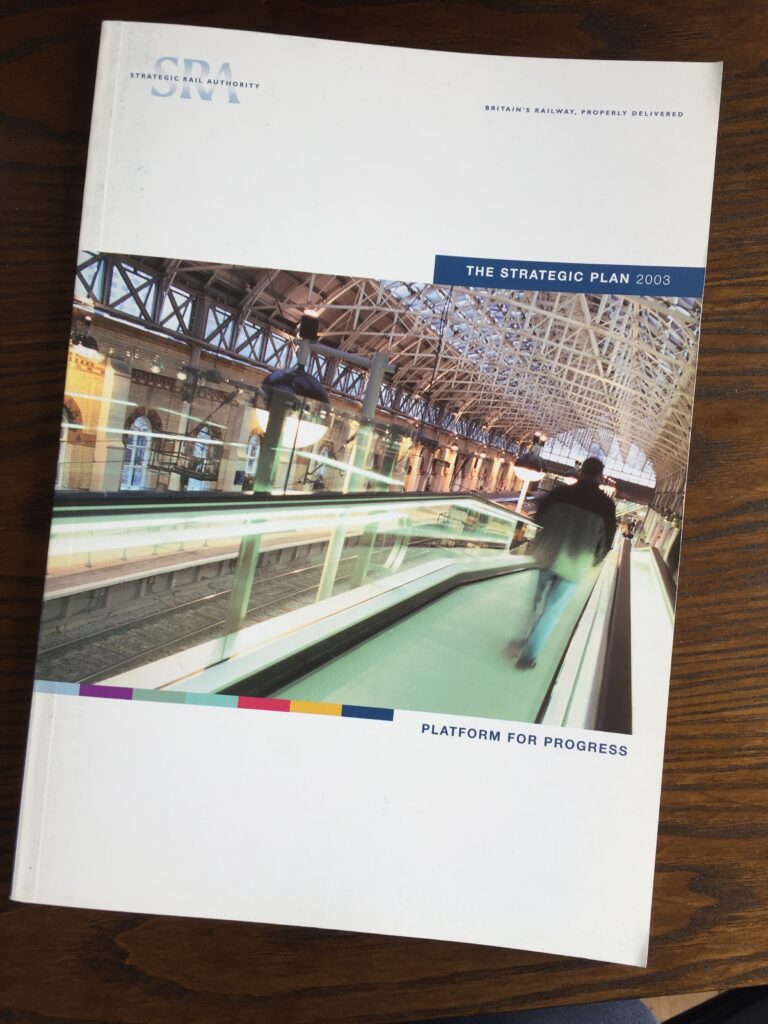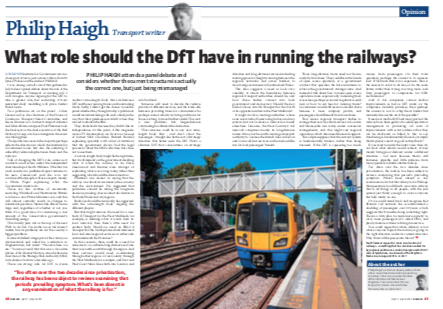London’s Institute for Government sits in a classy part of town, just a stone’s throw from St James’ Palace and the clubs of Pall Mall.
I was among a small crowd that gathered in July to hear a panel debate about the role of the Department for Transport in running rail. I can’t imagine anyone arguing that the DfT should take a greater role but extricating it from persistent daily meddling will prove harder than it looks.
Two politicians sat on the panel. Lilian Greenwood is the chairman of the House of Commons Transport Select Committee. Susan Kramer is a former transport minister and Liberal Democrat peer. Paul Plummer took the final seat at the chief executive of the Rail Delivery Group.
That the majority were politicians perhaps reflects the direction in which the Institute for Government looks. It reflects the enduring if unhealthy relation between them and the railways too.
Talk of changing the DfT’s role comes as it conducts a rail review under the independent chairmanship of Keith Williams. Whether his work results in a published report remains to be seen. Greenwood said she was not convinced that people will see a report but merely a White Paper explaining what the government wants to do.
What to do amid uncertainty
There’s also swathes of uncertainty encircling Whitehall and Westminster. Britain is to have a new prime minister soon and this will almost certainly result in changes to ministerial positions. Meanwhile, Brexit looms large. Whether you think it’s a good idea or not, it’s consuming a vast amount of the Conservative government’s dwindling energy.
This hardly puts rail at the top of the next PM’s ‘to do’ list. I’m loathe to say rail doesn’t matter but its problems are not the country’s biggest problem.
Kramer labelled a large part of the railway as dysfunctional and called for less fragmentation. She noted: “We are where we are”. You may recall that this was a favourite phrase of Alastair Morton when he chaired the Strategic Rail Authority two decades ago.
There are strong calls for DfT to create another arms-length body that sits between DfT and those running trains and maintaining tracks.
Sadly I didn’t get to ask the panel if they thought today’s politicians would resist interfering with such a body. Their predecessors didn’t when they abolished the SRA.
They abolished it because they didn’t like its independence. At this point, if this were a TV documentary, we’d cut to a close-up of former SRA Chairman Richard Bowker. He’d explain that the government always had the legal powers to direct the SRA’s activities. It chose not to use them.

Give power to the regions
An arms-length body might be the right idea but it will depend on the government deciding what it wants the railway to do. Here Greenwood and Kramer were stronger at explaining what was wrong today rather than suggesting what should be done tomorrow. Paul Plummer was clearer. He said that the railway was about its customers, the economy and the environment. He suggested that politicians should be taking the long-term decisions and making choices about devolution to Scotland, Wales and city regions.
Railways should be run locally, he suggested, with the arms-length body aligning the different players.
But that might be to remove the need for a new body. If Transport for the West Midlands defines what it wants from its local network then there’s little need for another body. Would we need a ‘Strategic Rail Authority 2’ if Transport for the North planned and delivered local and inter-regional services?
In this scenario, we could need someone to co-ordinate long-distance services that cross north-south through the region. Those services would need co-ordinating through other regions. For example, CrossCountry through the West Midlands. Or the East and West Coast Main Lines between London and Scotland.
Someone will need to decide the relative priority of different services. This could be between providing trains for commuters who perhaps cannot afford city living and trains for those wishing to travel further. This isn’t a new problem but longer-distance commuting has blurred the distinction.
DfT should give strategic direction
That someone could be in any new arms-length body. But – and don’t shoot the messenger – it might also be the sort of strategic direction that better suits the DfT. That’s a slimmer DfT that concentrates on strategic aims and long-distance services (including making space for freight) running between the regional networks and across borders to devolved governments.
This means looking very carefully at where the boundaries between regional transport authorities should lie. And looking at how those bodies connect into local government and democracy. Should the key hub of Crewe sit with Transport for the North or the West Midlands?
It might involve creating authorities where none exists today. Eastern Anglia has a railway system but not a dense network as found elsewhere. Likewise, the West Country’s rail network comprises mainly of its long-distance routes. Branch lines in Devon and Cornwall may not justify an authority but their services should run for local passengers’ benefit.
A strategic role for open access?
Long-distance trains need not be run solely by franchises. They could be in the hands of open access operators. Or a government contract that specifies the bare minimum to achieve the government’s strategic aims.
And instead of talk about how to make open access operations more expensive by increasing track access fees, perhaps economic regulators could look at how to cut fees for running trains? Government would still receive a decent share because it taxes company profits and passengers should benefit from lower fares.
That leaves regional transport bodies to arrange their services. Rail services in London and Merseyside run today under concession arrangements. This might suit regional operations which often need financial support.
This all presupposes that the current system is fundamentally broken rather than being misused. If the DfT is squeezing too much money from passengers via their train operators, perhaps the answer is to squeeze less?
If Network Rail is too expensive then is the answer to ask it to do less? Or do the same better, rather than trying to wring more cash from passengers to compensate for NR’s inefficiencies?
And if rail companies cannot deliver improvements as fast as DfT wants (or the companies foolishly promise) then perhaps the answer is not to whip them harder but maturely discuss the art of the possible?
Too much, too soon
It seems to me that DfT and many parts of the railway have been guilty of woeful expectation management. They have promised all sorts of improvements with little evidence that they can be delivered. Does this mean that franchising is fundamentally flawed or simply that its players aren’t as good as they think?
If you tend towards the latter view then it’s not clear what reform would achieve. It may merely bring poor delivery under a different structure. Not least because there’s still immense appetite and little patience from many quarters to bring a build a better railway.
Too often over the two decades since privatisation, the railway has been subject to reviews examining that period’s prevailing symptom. What’s absent is any examination of what the railway is for. What is its strategic direction? Perhaps the questions are too difficult? We want a railway that is all things to all people. One with its jam spread thinly enough to cover everyone but satisfy no-one.
Or we could stand back and recognise that Britain’s rail network has doubled passengers over 20 years. That suggests that it must be doing something right. There’s a firm plan to create more capacity to carry more passengers (it’s called HS2). And there are many more new trains to bring into service.
You could argue that while delivery is poor, the railway is going in the right direction under its current structure. Why throw all the pieces into the air?
This article first appeared in RAIL 883, published on July 17 2019.
